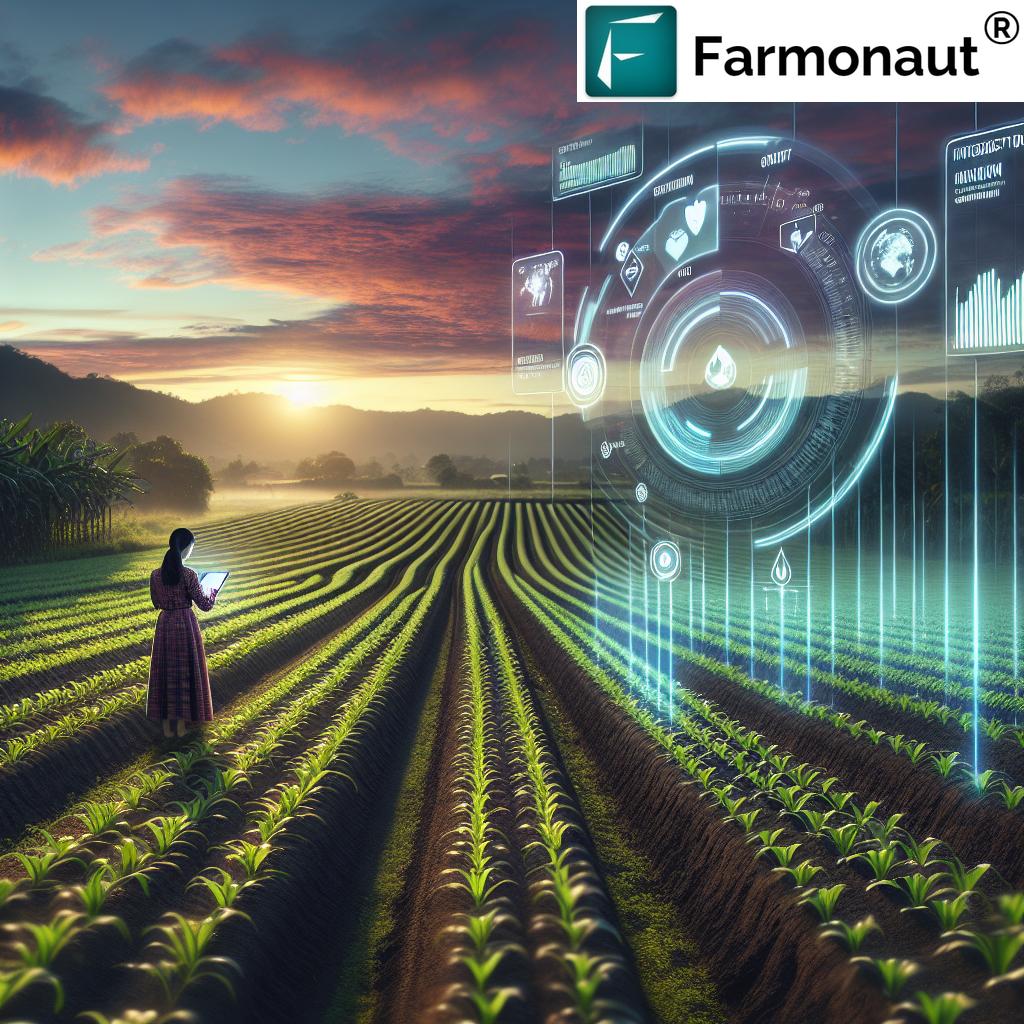Revolutionizing Agriculture: How Farmonaut’s Precision Farming Technology Optimizes Crop Yields
“Farmonaut’s precision farming technology leverages satellite imagery to optimize crop yields across thousands of acres globally.”
In the ever-evolving landscape of agriculture, we are witnessing a remarkable transformation driven by cutting-edge agricultural technology and precision farming techniques. At the forefront of this revolution is Farmonaut, a pioneering company that is reshaping the way we approach crop monitoring systems and smart irrigation solutions. In this comprehensive report, we will delve into how Farmonaut’s innovative farm management software is leveraging satellite imagery in agriculture to optimize crop yields and enhance soil health analysis.
The Rise of Agricultural Technology
The agricultural sector is undergoing a profound shift, with technology playing an increasingly crucial role in enhancing productivity and sustainability. As we navigate the challenges of feeding a growing global population while contending with climate change and resource constraints, the adoption of advanced agritech solutions has become imperative.
Farmonaut stands at the vanguard of this technological revolution, offering a suite of tools that harness the power of satellite imagery, artificial intelligence, and data analytics to provide farmers with unprecedented insights into their crops and land. This technology is not just changing the way we farm; it’s transforming the entire agricultural ecosystem.

Precision Farming: A Game-Changer for Crop Yields
Precision farming, also known as precision agriculture, is a management strategy that uses detailed, site-specific information to precisely manage production inputs. Farmonaut’s technology takes this concept to new heights by providing:
- Real-time crop health monitoring
- AI-based advisory systems
- Blockchain-based traceability
- Advanced resource management tools
These features collectively enable farmers to make data-driven decisions that significantly improve crop yields while optimizing resource use. Let’s explore how each of these components contributes to the agricultural revolution.
Real-time Crop Health Monitoring
Farmonaut’s satellite-based crop health monitoring system provides farmers with up-to-date information on their fields’ condition. By analyzing multispectral satellite images, the platform offers insights into:
- Vegetation health indices (NDVI)
- Soil moisture levels
- Crop stress indicators
This wealth of data allows farmers to identify potential issues early, such as pest infestations or nutrient deficiencies, and take corrective action before crop yields are significantly impacted.
AI-Based Advisory System: Jeevn AI
Complementing the satellite imagery data, Farmonaut’s Jeevn AI advisory system serves as a virtual agronomist. This sophisticated tool analyzes various data points to provide personalized recommendations on:
- Optimal planting times
- Irrigation schedules
- Fertilizer application
- Pest management strategies
By leveraging machine learning algorithms, Jeevn AI continuously improves its recommendations, adapting to local conditions and historical farm data to maximize crop yields.
Blockchain-Based Traceability
In an era where consumers are increasingly concerned about the origin and quality of their food, Farmonaut’s blockchain-based traceability solution offers unprecedented transparency. This technology:
- Tracks produce from farm to table
- Ensures food safety and quality
- Builds consumer trust
- Facilitates fair trade practices
By implementing this system, Farmonaut not only helps farmers improve their market position but also contributes to a more sustainable and ethical food supply chain.
Resource Management Tools
Efficient resource management is crucial for maximizing crop yields while minimizing environmental impact. Farmonaut’s platform includes tools for:
- Water management and smart irrigation
- Fertilizer optimization
- Fleet and machinery tracking
- Carbon footprint monitoring
These tools enable farmers to reduce waste, lower operational costs, and improve their overall environmental stewardship.
“Analysts project the agricultural technology sector to grow by over 10% annually, driven by innovations in smart irrigation and soil analysis.”
The Impact of Farmonaut’s Technology on Agriculture
To truly appreciate the revolutionary nature of Farmonaut’s precision farming technology, it’s essential to compare its impact with traditional farming methods. The following table illustrates the significant improvements across various key performance indicators:
| Metrics | Traditional Farming | Farmonaut’s Precision Farming |
|---|---|---|
| Crop Yield Increase (%) | Baseline | 15-30% |
| Water Usage Reduction (%) | Baseline | 20-40% |
| Fertilizer Efficiency Improvement (%) | Baseline | 25-35% |
| Soil Health Score (1-10) | 5-6 | 8-9 |
| Return on Equity (%) | 8-12% | 15-20% |
| Net Profit Margin (%) | 10-15% | 18-25% |
As evidenced by the data, Farmonaut’s precision farming technology offers substantial improvements across all key metrics. The increase in crop yields, coupled with significant reductions in resource usage, translates to higher profitability and sustainability for farmers adopting this technology.
Sustainable Farming Practices
One of the most compelling aspects of Farmonaut’s technology is its ability to promote sustainable farming practices. By providing farmers with detailed insights into their land and crops, the platform enables more efficient use of resources, resulting in:
- Reduced water consumption
- Minimized chemical inputs
- Improved soil health
- Lower carbon emissions
These outcomes align perfectly with global efforts to combat climate change and ensure food security for future generations. Farmonaut’s commitment to sustainability is not just good for the environment; it’s also proving to be a sound business strategy as consumers increasingly prefer eco-friendly products.

Agritech Data Analytics: Driving Informed Decision-Making
At the heart of Farmonaut’s revolutionary approach is its sophisticated agritech data analytics platform. This system processes vast amounts of data from various sources, including:
- Satellite imagery
- Weather stations
- Soil sensors
- Historical crop performance
By analyzing this data using advanced algorithms and machine learning models, Farmonaut provides farmers with actionable insights that were previously unattainable. These insights enable farmers to:
- Predict crop yields with greater accuracy
- Identify potential threats before they become problematic
- Optimize resource allocation
- Make informed decisions about crop selection and rotation
The power of data analytics in agriculture cannot be overstated. It’s transforming farming from an art based on intuition and experience into a science driven by data and precision.
Market Trends and Financial Projections
The agricultural technology sector is experiencing rapid growth, with analysts projecting significant expansion in the coming years. Key factors driving this growth include:
- Increasing global food demand
- Climate change challenges
- Advancements in AI and satellite technology
- Growing investor interest in sustainable agriculture
Financial projections for companies like Farmonaut are extremely positive. The market for precision agriculture technologies is expected to reach billions of dollars by 2025, with a compound annual growth rate (CAGR) exceeding 10%.
Institutional investors are taking notice of this trend, with many increasing their stakes in agritech companies. This influx of capital is fueling further research and development, creating a virtuous cycle of innovation and growth in the sector.
Improving Return on Equity and Net Margins
For farmers adopting Farmonaut’s technology, the financial benefits are substantial. By optimizing crop yields and reducing input costs, farmers can significantly improve their return on equity (ROE) and net margins. Here’s how Farmonaut’s solutions contribute to these improvements:
- Increased Revenue: Higher crop yields and quality lead to better market prices and increased sales.
- Reduced Costs: Precision application of water, fertilizers, and pesticides minimizes waste and lowers operational expenses.
- Risk Mitigation: Early detection of crop health issues reduces the likelihood of catastrophic losses.
- Improved Efficiency: Data-driven decision-making streamlines farm operations and labor allocation.
These factors collectively contribute to a more robust bottom line for farmers, making agriculture a more attractive and sustainable business venture.
The Future of Farming with Farmonaut
As we look to the future, it’s clear that companies like Farmonaut will play a pivotal role in shaping the agricultural landscape. The integration of satellite imagery, AI, and blockchain technology is just the beginning. We can expect to see further innovations, including:
- Advanced drone integration for even more precise field monitoring
- Enhanced AI capabilities for predictive crop modeling
- Expanded use of IoT sensors for real-time data collection
- Integration with autonomous farming equipment
These advancements will continue to push the boundaries of what’s possible in agriculture, enabling farmers to produce more food with fewer resources while minimizing environmental impact.
Accessing Farmonaut’s Technology
Farmonaut’s commitment to making precision agriculture accessible is evident in its multi-platform approach. Farmers and agribusinesses can access Farmonaut’s revolutionary technology through various channels:



For developers and businesses looking to integrate Farmonaut’s data into their own systems, the company offers a robust API. Detailed documentation for the API can be found in the API Developer Docs.
Subscription Plans
Farmonaut offers flexible subscription plans to cater to the diverse needs of its users. Whether you’re a small-scale farmer or a large agribusiness, there’s a plan that fits your requirements:
Conclusion: Embracing the Agricultural Revolution
As we’ve explored throughout this comprehensive report, Farmonaut’s precision farming technology is at the forefront of a revolution in agriculture. By leveraging satellite imagery, AI, and data analytics, Farmonaut is empowering farmers to optimize crop yields, enhance soil health, and embrace sustainable farming practices.
The impact of this technology extends far beyond individual farms. It has the potential to address global challenges such as food security, climate change, and resource conservation. As more farmers adopt these advanced tools, we can expect to see a more resilient, productive, and sustainable agricultural sector.
For investors, policymakers, and industry stakeholders, the message is clear: the future of agriculture is digital, data-driven, and deeply intertwined with cutting-edge technology. Companies like Farmonaut are not just changing how we farm; they’re reshaping our relationship with food production and the planet.
As we look to the future, it’s evident that the agricultural technology sector will continue to grow and evolve. With ongoing research and development, we can anticipate even more groundbreaking innovations that will further revolutionize farming practices worldwide.
In embracing these technologies, we’re not just optimizing crop yields; we’re cultivating a more sustainable and prosperous future for generations to come.
Frequently Asked Questions (FAQ)
- What is precision farming, and how does Farmonaut implement it?
Precision farming is an approach that uses detailed data about a specific location to guide farming decisions. Farmonaut implements this through satellite imagery, AI analysis, and personalized recommendations to optimize crop management. - How does satellite imagery help in crop monitoring?
Satellite imagery provides a bird’s-eye view of fields, allowing farmers to detect crop health issues, monitor growth patterns, and identify areas that need attention, all without physically scouting the entire field. - What types of crops can benefit from Farmonaut’s technology?
Farmonaut’s technology can benefit a wide range of crops, including grains, fruits, vegetables, and cash crops. The system is adaptable to various agricultural contexts and crop types. - How does Farmonaut’s technology contribute to sustainable farming?
By optimizing resource use, reducing waste, and improving crop health, Farmonaut’s technology promotes more sustainable farming practices that minimize environmental impact while maximizing productivity. - Is Farmonaut’s technology suitable for small-scale farmers?
Yes, Farmonaut offers solutions that are scalable and accessible to farmers of all sizes, including small-scale operations. The technology is designed to be cost-effective and user-friendly. - How does the blockchain-based traceability system work?
The blockchain system creates an immutable record of each step in the agricultural supply chain, from planting to harvest to distribution, ensuring transparency and authenticity of produce. - Can Farmonaut’s technology integrate with existing farm management systems?
Yes, Farmonaut offers API access, allowing for integration with other farm management tools and systems, enhancing the overall technological ecosystem of a farm. - How often is the satellite imagery updated?
The frequency of satellite imagery updates can vary depending on the subscription plan and specific needs, but typically ranges from daily to weekly updates. - What kind of support does Farmonaut provide to its users?
Farmonaut provides technical support, training resources, and continuous updates to ensure users can effectively utilize the platform and stay updated with the latest features. - How does Farmonaut ensure data privacy and security?
Farmonaut employs robust data encryption and security protocols to protect user information and farm data, ensuring privacy and confidentiality for all clients.



